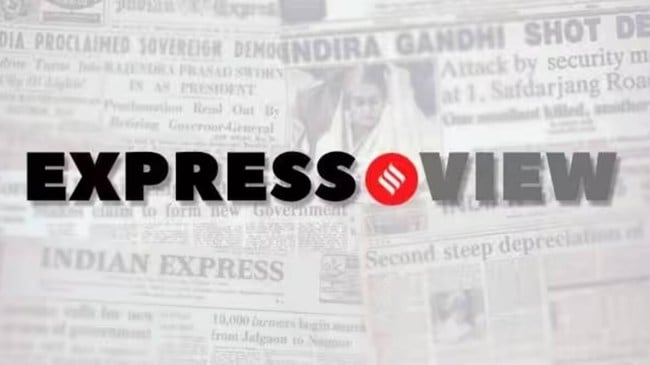Opinion Express View: Attack on CJI Gavai, assault on tolerance
Chorus of condemnation of the attack on the Chief Justice of India is welcome. It will ring louder if it's also read as a criticism of intolerance
 The PM's timely, strong — and much-needed — condemnation of the attack on the CJI becomes all the more powerful if it is read, also, as criticism of this growing intolerance.
The PM's timely, strong — and much-needed — condemnation of the attack on the CJI becomes all the more powerful if it is read, also, as criticism of this growing intolerance. The attack on the Chief Justice of India by a lawyer who allegedly hurled a shoe at him inside the Supreme Court Monday morning marked a new low. That the head of the institution of the judiciary should be targeted, apparently for remarks he made while refusing to entertain a public interest litigation seeking judicial intervention for the reconstruction of an idol of Lord Vishnu in a Khajuraho temple – comments that were misinterpreted by a troll army citing “hurt Hindu sentiments”, and that the CJI clarified subsequently — signals a breakdown of democratic civility. At the same time, the reaction to Monday’s attempted attack has also been uncommon, and welcome. In these polarised times, it has seen a rare coming together of leaders across political-ideological faultlines, to express their condemnation, with Prime Minister Narendra Modi taking the lead. The PM has said that the attack had “angered every Indian” and that there is “no place for such reprehensible acts in our society”. PM Modi’s words, and those of others belonging to the ruling establishment as well as the Opposition, underline that Monday’s incident was more than an attack on one individual – it was an act of disrespect towards the institution of the judiciary, the Constitution it upholds, and the rule of law.
Implicit, and also explicit in the outrage that is being expressed, giving it an undeniable edge, is the fact that the Chief Justice is also a Dalit. While CJI Gavai has not sought to draw attention to himself, kept his dignity and composure, and even signaled business as usual, political parties and leaders are rightly mindful and protective of the powerful symbolism of his presence at the apex of the judicial system. After all, the journey of an individual from India’s most marginalised to the judiciary’s top, the overcoming of incredible odds and the tracing of a long arc, are democracy’s precious achievements. But having said that, there is something more to this incident that must be acknowledged, and hopefully built on, going ahead. Quite simply, Monday’s attack must be looked at, and condemned, from both ends. It is unacceptable that a CJI, in this case a Dalit CJI, should be targeted. It is indefensible that this is done by claiming the CJI insulted Hinduism.
These are times when “Hindu/Hinduism under siege” has become a convenient justification for a range of transgressions by individuals and the mob, leading to shrinking spaces for expression and a coarsening of the public sphere. All too often, what makes the situation worse is that the powers-that-be turn a blind eye to this aggressive performance of victimhood, which curtails the rights of a range of vulnerable others. While the political project of Hindutva has notched its several successes by constantly widening its ambit, and coopting movements and strands that lay outside it, this has not been a seamless movement. There are collisions and contradictions, and often there is a tendency to label and demonise those who oppose, and attack any signs of perceived disagreement. The PM’s timely, strong — and much-needed — condemnation of the attack on the CJI becomes all the more powerful if it is read, also, as criticism of this growing intolerance.





